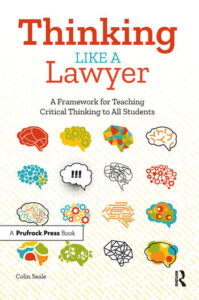
Wondering Like a Lawyer: A Framework for Training Vital Pondering to All Students
By Colin Seale
(Routledge/Prufrock Press, 2020 – Study much more)
Reviewed by Kimberly Rensch
 Everyone who has been associated in the training sector in the previous decade certainly understands a detail or two about 21st century techniques.
Everyone who has been associated in the training sector in the previous decade certainly understands a detail or two about 21st century techniques.
Balancing academic standards with those people gentle expertise that students need to be effective citizens is challenging at finest.
Any e book that reads immediately and presents realistic strategies to combine thinking capabilities with educational curricula is well worth looking at. Considering Like a Attorney by former math instructor turned attorney Colin Seale is this kind of a book.
Loads to Chew On
 Seale’s guide is comprised of limited, digestible chapters whole of highlightable sound bites and statements that readers will have to metabolize lengthy immediately after they place down the e-book.
Seale’s guide is comprised of limited, digestible chapters whole of highlightable sound bites and statements that readers will have to metabolize lengthy immediately after they place down the e-book.
He expenses educators with the monumental endeavor of “equip[ping] pupils with the navigational and inquiry instruments they have to have to master how to find out and use this discovering across disciplines” (16) since “[t]he wisest students are those people who have the consciousness to recognize what they do not know and the truth of the matter-in search of impulse to completely examine thoughts to access a workable depth of information knowledge” (16-17).
Seale presents his contact for creating students’ significant thinking skills in three pieces: Closing the Significant Contemplating Gap Pondering Like a Law firm and Realistic Considerations for a Critical Imagining Revolution.
Component One: Why important thinking?
The book’s very first 3 chapters start off with a vulnerable Seale describing his sophisticated school job and the route he took to believing that all college students ought to have to be taught important pondering capabilities. He recounts a pivotal instant late in substantial school when a teacher’s belief in his likely served him turn a corner and graduate on a high note.
Seale devotes the remainder of Section One particular to defining crucial pondering and laying out why it is so essential for college students to produce important considering techniques in purchase “to be certain an active and engaged citizenry” (24). Visitors will respect Seale’s enhanced definition of vital pondering, which include the two competencies and dispositions of important thinkers.
Element Two: Lawyerly capabilities
At the heart of this guide is Colin Seale’s simile, Wondering Like a Attorney, or thinkLaw for limited.
 Though instructing in one particular of the most hard educational institutions in Las Vegas, Seale produced “the questionable daily life decision” (31) to become a element-time law university pupil. It was during this time that thinkLaw began having condition.
Though instructing in one particular of the most hard educational institutions in Las Vegas, Seale produced “the questionable daily life decision” (31) to become a element-time law university pupil. It was during this time that thinkLaw began having condition.
It is a frequent perception that a youngster prone to arguing really should sometime grow to be a attorney, but Seale sets the document straight on the expertise that legal professionals genuinely need.
He wraps these capabilities up into four methods, each of which will get a chapter with an explanation, a relationship to a genuine-everyday living authorized scenario, and a sample activity for each and every core material space (language arts, science, math, and social scientific studies). The 1 exception is the tactic known as Analysis From A number of Perspectives, which will get a two-chapter remedy for the reason that, according to Seale, it is the “fundamental thinkLaw strategy” (45).
Instructors will take pleasure in the actuality that chapters study promptly, but are packed entire of useful very little nuggets, like graphic organizers, rubrics, and Seale’s individual modeling of how to think through a authorized scenario that highlights the crucial wondering technique featured in every chapter.
One particular limitation that may possibly frustrate some is that instance things to do are not shown for elective and encore classes (health and fitness, PE, planet languages, and many others.), but instructors are almost nothing if not artistic and resourceful and should really be capable to establish vital thinking prospects for their disciplines dependent on the applications previously readily available in every single chapter.
Aspect 3: Reframing assistance
Seale doesn’t just dump the thinkLaw techniques in readers’ laps and desire us luck. The book’s last five chapters tackle “practical considerations” to bringing thinkLaw to daily life in our classrooms. He sets out to reframe our pondering on learners with disruptive behaviors, describing how these students may well be our very best innovators and most very likely to thrive at imagining critically.
Just one chapter even addresses how we can leverage significant contemplating chances to best prepare students for state assessments. Seale’s final chapter encourages educational institutions to engage dad and mom and families as associates in establishing children’s significant thinking skills.
Remaining Views: Superior for all pupils
While posted by Prufrock Press, a publishing corporation specializing in assets for lecturers of gifted and high potential learners (and now owned by Routledge), Imagining Like a Attorney is for instructors of all pupils. As the creator routinely notes, from time to time our students who wrestle the most conclude up getting our most effective out-of-the-box thinkers.
And a single ultimate thing to consider centers on grading. I know from encounter that college districts wanting to carry 21st century techniques into their school rooms have had lots of conversations about how to assess and, therefore, grade these competencies – as grades are an unfortunate reality for most lecturers. Other than some rubrics with points, Seale does not spend significantly time addressing how to quality essential contemplating routines. Some of his methods make fantastic bell get the job done and do not involve scoring.
For other tactics, Seale demonstrates how to combine them with current specifications and curricula (e.g., educating pupils how to take into consideration lots of perspectives ahead of coming up with a claim in argumentative producing). It is probable that a focus on critical wondering will raise scholar engagement, thus improving upon the quality of their perform and elevating grades.
Kim Rensch (@KJRensch) is a Nationwide Board Qualified Trainer operating as a member of the Gifted Expert services crew for Fargo General public Educational institutions in North Dakota. She is also a Teacher-Guide in the Pink River Valley Writing Venture. When she’s not performing a thing college-similar, Kim can be located at church or investing time with her spouse, their canine, or her lots of plants and bouquets.







